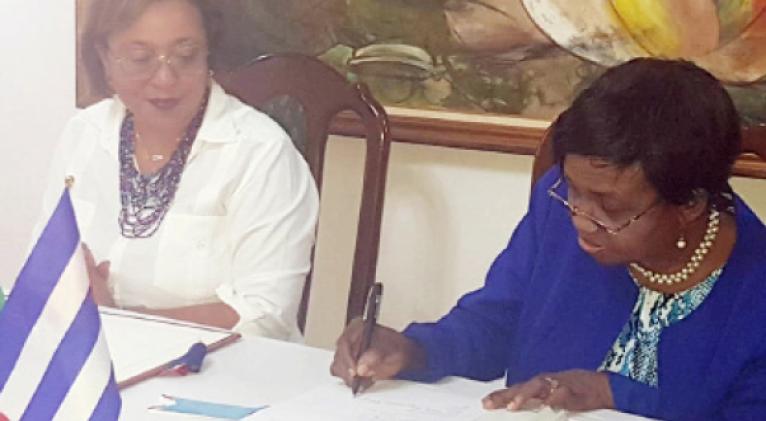Cuba, Nigeria Enhance Capacities In Healthcare Sector
especiales

This year, the Republic of Cuba and Nigeria will mark 50 years of bilateral ties as significant achievements have been recorded by both countries in the health sector, cultural relations as well as economic cooperation.
Apart from the historic ties between both countries, Cuba has provided expertise and experience in the medical fields with the production of COVID-19 vaccines during the peak of the pandemic, which benefitted Nigeria and other parts of the world.
This relation was boosted recently when both countries signed a Memorandum of Understanding (MoU) to strengthen their capacity in the area of regulatory activities in the pharmaceutical, biotechnology, biological and other related fields.
This agreement was signed recently in Abuja by Nigeria’s National Agency for Food and Drug Administration and Control (NAFDAC) and Cuba’s Center for State Control of Medicines and National Devises (CECUED), to promote links in these spheres.
Speaking during the event, Cuban Ambassador to Nigeria, Miriam Morales Palmero, said “the historic relations between Cuba and Nigeria are further strengthened with the signing of the MoU,” stressing that Cuba is prepared to share all its advances in medicines.
She assured that her country will also collaborate with Nigeria in statistical systems, their management and in institutions that treat communicable diseases as well as Cuban biotechnological products in human and animal health and in agriculture.
The Cuban envoy said “we consider it appropriate to propose the resumption of collaboration in the tissue culture and promote meetings at the expert level with BIOCUBAFARMA and other Cuban institutions”.
She expressed profound excitement at the occasion, adding that the agreement will solidify the Cuba Nigeria relations because of the Cuban heritage of Africa connection.
NAFDAC DG, Prof Mojisola Adeyeye, who signed the agreement on behalf of Nigeria, said the deal was meant to promote good regulatory practice and good reliance practice. She noted that part of the reliance practice that WHO expects from countries is working closely together with other national regulatory authorities and sister agencies such as Cuba in this instance.
She said, “We have interacted at WHO level, at International Council on Harmonization level but again this is the beginning of a great relationship and a renewal of our own history, which will benefit our people.
“Cuba has a high capacity in biotechnology and we can gain a lot from that. Nigeria has very great capacity in regulatory system strengthening and Cuba can gain a lot from it. So, it is going to be a win- win situation for both agencies of the two countries.
“This is just sealing that relation openly, more so for our medical products or food products or other regulated products. We need more information sharing with Cuba and the Presidential Executive Order that went out about two months ago underscores the importance of Nigeria working with other countries, Cuba in this case and Cuba working with us in terms of trading.
“Cuba has high intellectual competence in biotechnological products, vaccines and biological products and Nigeria will gain a lot from it and of course from NAFDAC perspective we are Maturity Level 3 going to Maturity level 4 and there is a lot that Cuba can also gain from us.”
The historical ties between both countries make it incumbent on them to collaborate in the medical fields as espoused during the COVID-19 crisis to ensure that companies producing vaccines in the Republic of Cuba can be established in Nigeria for fruitful bilateral relationships.
Cuba has done so much in the Primary Health Sector and Nigerian is also replicating the same for the growth and development of the nation. However, the Nigerian government can tap into Cuba’s wealth of experience in order to achieve its quest for health for all in the country.
Vaccine production will play a key role in tackling the emerging and re-emerging diseases in country, such as Malaria, Lasa fever, monkey pox as all diseases. Therefore, collaborating with Cuba will go a long way in strengthening efforts in producing vaccines locally so as to enable the country to prevent childhood diseases such as polio, tetanus and tuberculosis.
Vaccine production is for the betterment of the Nigerian society as both countries strengthen their bilateral ties especially in producing cure for the killer disease such as malaria that kill thousands of people in Nigeria every year.
It is instructive that Cuba had eliminated malaria since 1967 and Nigeria and other West African countries must ask the country to come to Africa to eliminate malaria, not control it.














Add new comment